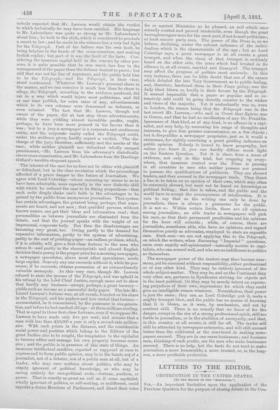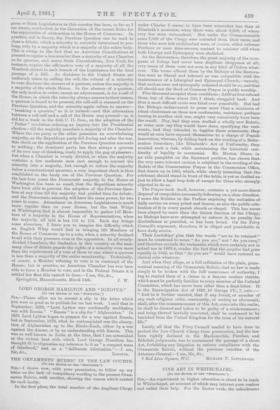LETTERS TO THE EDITOR.
gress or State Legislatures iu this country has been, so far as I am aware, overlooked, in the discussion of the recent Rules for the suppression of obstruction in the House of Commons. In practice, not in theory, the Previous Question can be used to close a debate, which a minority is seriously determined to pro- long, only by a majority which is a majority of the entire body. This is owing to the fact that no American Constitutions at present recognise a less number than a Majority of any Chamber as its quorum, and many State Constitutions, New York, for instance, require the affirmative vote of a majority of all the Members elected to each branch of the Legislature for the final passage of a Bill. As divisions in the United States are uniformly taken by calling the roll, the refusal of a minority to vote discloses the absence of a quorum, unless the majority is a majority of the whole House. In the absence of a quorum, the only motion in order, except an adjournment, is for a call of the House, in which the minority always answer to their names, a quorum is found to be present, the roll-call is resumed on the Previous Question, and the minority again refuse to answer-
" breaking a quorum," as it is termed—and this alternation between a roll-call and a call of the House may proceed—as it did for a week in the 45th C. II. Sess., on the adoption of the " Potter " resolution ordering an inquiry into the Presidential election—till the majority marshals a majority of the Chamber. Where the one party or the other possesses an overwhelming majority, as the Republican party did during and after the war, this check ou the application of the Previous Question amounts to nothing ; the dominant party has then always a quorum of its own way of thinking, ready to apply the gag at pleasure ; but when a Chamber is evenly divided, or when the majority contains a few moderate men (not enough to convert the minority into a majority, but enough to reduce the majority below a constitutional quorum), a very important check is thus established on the hasty use of the Previous Question. For the last four years the Democratic majority in the House at Washington has been so small, that the Republican minority have been able to prevent the adoption of the Previous Ques- tion at any time till the majority had yielded time for debate ; and the Democratic minority will have the same power, for two years to come. Attendance on American Legislatures is much more regular than on your House, but the best Whips at Washington find it almost impossible to gather 147 Mem- bers of a majority in the House of Representatives, when the majority all told is but 150 to 152. Each day brings some absentees. I leave you to imagine the difficulty which an English Whip would find in bringing 329 Members of the House of Commons up to a vote, when a minority declined to aid with their presence even in the opposition. In all evenly- divided Chambers, the limitation in this country on the sum- mary close of debate guards the rights of a minority even more than the requirement of a vote of three to one, where a quorum is less than a majority of the entire membership. Technically, of course, a Member refusing to vote is in contempt of the House ; but in practice, no American Chamber has ever been able to force a Member to vote, and in the Federal Senate it is settled law Irliat this cannot be done.—I am, Sir, &c., Springfield, Massachusetts, March 14th. J. W.

































 Previous page
Previous page